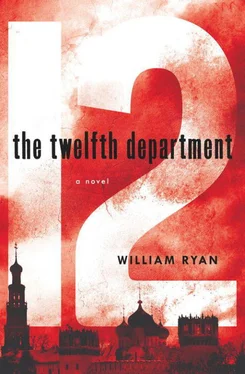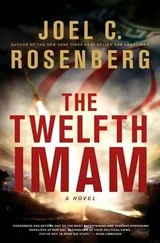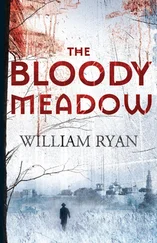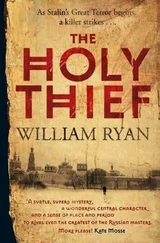“No need,” Korolev said. “I’m sure you’re right. Not subtle when it comes to following a man, are they?”
“I think they want be seen, Korolev. I think they wouldn’t be following orders if they weren’t seen. They’re trying to distract you. To put pressure on you.”
Korolev thought back—it had been different once, hadn’t it? Back at the time of the Revolution there’d been people who’d pushed their weight around, but you could just push right back—and if your heart was in the right place, it all worked out. How had this mess come about? Here he was, an honest-enough policeman, doing his job, and being followed around Moscow by a couple of State Security bruisers for no good reason other than simply that—he was doing his job.
“Let’s just go,” Korolev said, with a sigh and, sure enough, the two heavies managed to summon enough energy to get themselves into their car and pull away from the curb at the same time as he did. Korolev took a quick glance in the mirror and then decided he’d enough on his plate without worrying about them as well.
“Madame Shtange told me about her husband’s relationship with Azarov. And a few other interesting things as well.”
“Tell me what she said.”
Korolev told him and, despite his best intentions, wasn’t able to resist the occasional instinctive glance in the rearview mirror.
“Yes, I think she may have described it correctly,” Dubinkin said when he’d finished. “The Azarov Institute was set up with the support of the former head of State Security, the counterrevolutionary Yagoda. I believe Comrade Ezhov wasn’t so convinced—perhaps he’s the one who commissioned this report. If so, he’s not telling us—which may mean something or may not.”
Korolev had given up trying to understand how things worked within the NKVD—it seemed no one trusted anyone else, however. Just like the rest of the population then.
“But the professor came up with some useful insights in the past, or so Colonel Rodinov said?”
“Yes, he did. Are you sure you want to know what they were?”
What choice did he have? If he didn’t know what the professor had been up to, how could he know how it might affect the case? Korolev nodded.
“He developed certain interrogation techniques. They’ve been particularly effective in preparing enemies of the state for public trial. He was able to ensure that they admitted their guilt, which was of course evident, and that any unnecessary justification or defense that might have misled suggestible citizens was avoided.”
Korolev thought back to the newsreels he’d seen of the trials in the cinemas—he was sure he wasn’t the only one who’d thought the defendants had seemed remarkably, if not eerily, compliant. He’d certainly never seen anything like it in a criminal trial. Senior Bolsheviks from long before the Revolution, who’d been in exile with Lenin, had pled guilty to incredible treacheries against the very State they’d fought tooth and nail to bring into being. Zinoviev, Kamenev, and half a platoon of the oldest Bolsheviks had been in cahoots with the snake Trotsky and, it seemed, nigh on every foreign enemy you could think of. Now, perhaps, that finally made sense.
“I see,” Korolev said, turning the car into the alleyway that led to the institute’s entrance.
He couldn’t help wondering how Azarov had gone about his research, although, at the same time, he wasn’t looking forward to finding out.
The guards manning the gates weren’t the same as the ones from Monday, but as soon as they saw Dubinkin’s identity card, their resentful suspicion changed to alert welcome. The taller of the two lifted the bar that guarded the entrance and the other walked alongside the car until they reached the back door of the main building.
From the street, the Azarov Institute appeared as though it had always been there and always would be there—but to judge from the activity in the courtyard it seemed this was not entirely the case. A number of workmen were loading trucks with cardboard boxes, metal bedsteads, wooden crates of various sizes, and even what looked like a dentist’s chair.
“What’s going on here?” Korolev asked the guard, who shrugged his shoulders
“I’m not the person to ask about such things, Comrade Captain.”
“Well, who is?”
“We just guard the gate, Comrade Captain. Maybe ask inside.”
“Guard it from who?”
“Enemies, I suppose.” Although the fellow looked like he was none too sure what an enemy might look like.
“What happened to the men who were guarding the gate on Monday?” Korolev asked, a possibility beginning to occur to him.
“I wouldn’t know, Comrade Captain. This is the first time I’ve ever been here. I hoped the Comrade Lieutenant might be able to tell us what time we’ll be relieved.”
When Dubinkin explained he couldn’t help them, the guard said his farewells and they saw him open his hands as he approached his comrade, as if to say—the new arrivals know nothing either. Which was true enough, Korolev thought.
One of the workers told them a man called Danilov was in charge and directed them into the main building where he assured them they’d find him easily enough. They followed the sound of conversation along a long, oak-lined corridor to what must have been an office but which now stood empty, only the shadows on the carpet indicating where furniture had once rested—and now the carpet was itself in the process of being rolled up by three men. One of the men, a broad-shouldered fellow in a blue shirt, damp with sweat, was telling the others what to do.
“Comrade Danilov?”
“What’s it to you?” He rose to his feet, looking at them without enthusiasm. But the surly manner disappeared when Dubinkin showed him his identification card.
“I’m sorry, Comrade Lieutenant,” the man said. “I thought you might be—well—I don’t know quite what I thought. I’m Danilov, right enough.”
“What’s going on here?” Korolev asked, stepping over the carpet the two other men were continuing to roll up, apparently oblivious to their presence.
“We’re moving the place. We’re to have it finished by tomorrow—a big task, I can tell you. But we’re up to it.”
Korolev looked to Dubinkin who was nodding his sympathy to the foreman. Behind them the carpet was lifted on to shoulders and then taken from the room, heading for the courtyard. The men’s footsteps sounded loud on the now-bare floorboards.
“Where to?” Korolev asked.
Danilov looked to Dubinkin for permission to answer. It seemed he was under the mistaken impression that Dubinkin was one of those who’d ordered the institute’s relocation at a moment’s notice. Korolev had to hand it to the Chekist, as Dubinkin gave his permission with a measured nod—he thought on his feet.
“We drive the trucks up Leningradsky Chaussée to a warehouse. Other drivers take them from there. As instructed.”
“Other drivers take them from there?” Korolev asked.
“It’s secret business. That’s all we need to know.” Danilov turned to Dubinkin. “We’re to tell no one what we’ve seen. Or what we’re doing. That’s understood, of course, Comrade Lieutenant. That’s why I wasn’t sure when you came in.”
“And what about the people? The people who worked here?” Korolev asked.
Danilov shrugged his shoulders. “I can’t help you, Comrade. There was no one here when we arrived yesterday.”
Dubinkin glanced at Korolev with a look that could only be described as meaningful. And, Korolev, despite his bemusement, took the hint. Danilov had clearly been told only what he needed to know—which wasn’t much. But if anyone was going to get what he knew out of him, it was going to be Dubinkin.
Читать дальше












